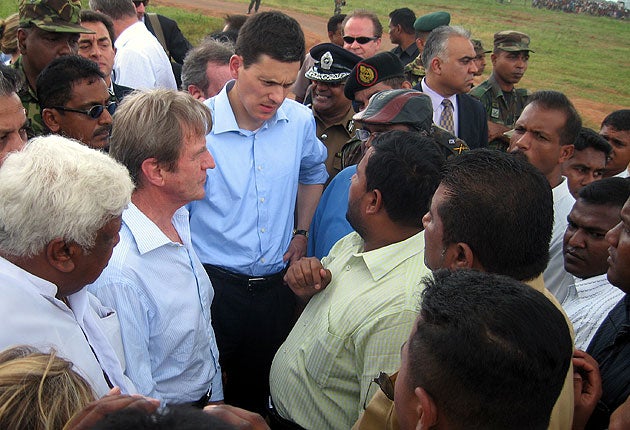Miliband adds voice to Sri Lanka ceasefire calls

With up to 50,000 desperate civilians still trapped in Sri Lanka's war zone, Foreign Secretary David Miliband has become the latest in a swelling chorus of international voices to call on the government to declare a humanitarian ceasefire.
On a visit to Sri Lanka with his French counterpart, Bernard Kouchner, Mr Miliband yesterday asked that the Sri Lankan government halt its offensive operation to allow the evacuation of civilians. He stressed this was not for the benefit of rebels making a last-ditch stand in the north-east of the country, but to save innocent lives. He also called on the separatist Liberation Tigers of Tamil Eelam (LTTE) not to prevent civilians from leaving the war zone.
"Protection of civilians is absolutely paramount at this moment. The LTTE must end preventing civilians leaving the conflict zone and the fighting must stop," he said. "No one in the international community has been calling for a ceasefire or to stop firing to save [LTTE leader, Vellupillai] Prabhakaran. The calls have come because of the overwhelming concern with the well-being of the civilians."
But the chorus of voices calling for a ceasefire is making little difference. After a brutal three-decade civil war with the LTTE, the Sri Lankan government is determined to crush what remains of a once potent rebel force. The country's powerful defence minister, Gotabhaya Rajapaksa, has said that a ceasefire would simply give the rebels an oppportunity to better dig in and force more civilians to take up arms. Last week, Sri Lanka's president, Mahinda Rajapaksa - the defence minister's brother - rejected a similar call for a ceasefire when he spoke on the telephone with Gordon Brown.
The military has said it has already stopped using heavy weaponry in its offensive against the last of the LTTE fighters. That claim, however, has been denied by a pro-Tamil website which claimed the Sri Lankan navy used 100mm cannons to launch attacks yesterday. It said that a makeshift hospital in the war zone was by struck by artillery shells and that at least 20 people were killed. The military has persistently denied firing at the hospital but with journalists and almost all aid workers actively prevented from reaching the war zone, such claims are impossible to confirm one way or another.
Mr Kouchner said that he had requested the government to allow access for aid workers and the UN. Since September last year, only the International Committee of the Red Cross (ICRC) have been allowed regular access to the conflict zone. Asked about the government's response to their requests, Mr Kouchner said: "We insisted, and we insisted, but it is up to our friends to allow it or not."
Part of the visit included a tour of one of the refugee camps where more than 150,000 civilians driven from their homes by the war are now being interned behind razor wire. Conditions in some of the hastily-constructed camps are far from pleasant and countless thousands of families are sheltering from the burning sun under little more than tarpaulins. Many of the people being held in these camps have complained about a lack of water though the government says adequate is being supplied. It was not clear last night whether Mr Miliband and Mr Kouchner had been taken to those camps or else to a longer-term "transition camp" where the facilities are considerably better and where journalists have been taken on escorted trips.
Either way, the question of refugees is going to be a fraught one for Sri Lanka in the months ahead. The authorities say the civilians are to be held no more than a year to allow their villages to be checked for mines and to permit a thorough vetting process that would determine whether any LTTE fighters are hiding among the civilians.
Join our commenting forum
Join thought-provoking conversations, follow other Independent readers and see their replies
Comments
Bookmark popover
Removed from bookmarks